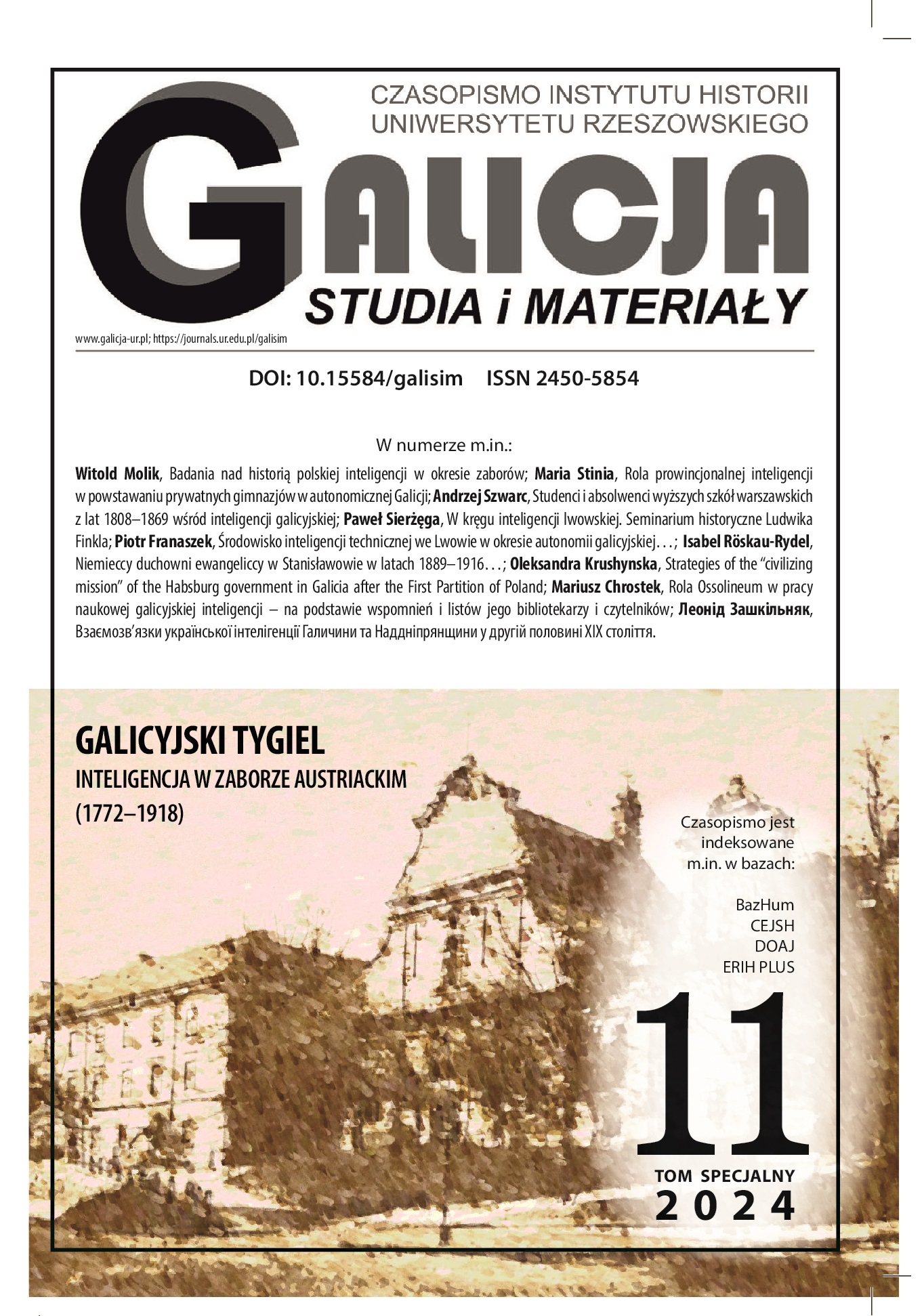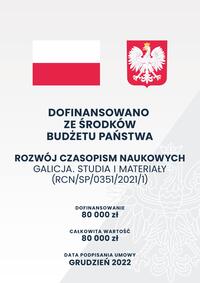Strategie „misji cywilizacyjnej” rządu Habsburgów w Galicji po I rozbiorze Polski
DOI:
https://doi.org/10.15584/galisim.2024.11.25Słowa kluczowe:
Królestwo Galicji i Lodomerii, monarchia Habsburgów, misja cywilizacyjna, absolutyzm oświeconyAbstrakt
Artykuł jest poświęcony analizie elementu „misji cywilizacyjnej” w planach i strategiach monarchii habsburskiej w „Królestwie Galicji i Lodomerii” w pierwszych latach po I rozbiorze Polski. Administracja cesarska stworzyła ambitny plan reform i przekształceń w Galicji, zmierzający do doprowadzenia ludności prowincji do postępu i dobrobytu w „habsburskim” rozumieniu tych pojęć oraz uczynienia z niej wzorowych obywateli cesarstwa. W celu zbadania tych planów, przyczyn ich powstania, a także ich realizacji w perspektywie krótkoterminowej, przeanalizowane zostaną teksty pierwszych patentów i zarządzeń rządu habsburskiego, a także raporty habsburskich urzędników zatrudnionych w Galicji, ze szczególnym uwzględnieniem elementu „misji cywilizacyjnej” tych dokumentów. Ponieważ zajęcie Galicji zbiegło się w czasie z popularnością filozofii oświeconego absolutyzmu i przeprowadzeniem reform w jej duchu w całej monarchii, prześledzony zostanie także wpływ tej filozofii na planowane przemiany Galicji.
Downloads
Bibliografia
Augustyniak U., History of the Polish-Lithuanian Commonwealth: State-Society-Culture, Frankfurt am Main 2015.
Beales D., Was Joseph II an Enlightened Despot? [in:] The Austrian Enlightenment and its Aftermath, eds. R. Robertson, E. Timms, Edinburgh 1991, p. 1–21.
Brawer A.J., Galizien, wie es an Österreich kam: eine historisch-statistische Studie über die inneren Verhältnisse des Landes im Jahre 1772, Leipzig 1910.
Csáky M., Feichtinger J., Prutsch U., Habsburg postcolonial: Machtstrukturen und kollektives Gedächtnis, Innsbruck : Wien 2003.
Continuatio Edictorium et Mandatorum Universalium in Regnis Galicie et Lodomerie. A die 28. Mensis Junii Anno 1773. Emanatorum, Leopoli 1774.
Czubaty J., The Attitudes of the Polish Political Elite towards the State in the Period of the Duchy of Warsaw, 1807–1815 [in:] Collaboration and Resistance in Napoleonic Europe, eds. M. Rowe, Basingstoke 2003, p. 169–185.
Edicta et mandata universalia Regnis Galiciae et Lodomeriae. A die 11 Septembr. 1772 initae possessionis promujgata, Leopoli 1773.
Fillafer F.L., The “Imperial Idea” and Civilising Missions, „Historyka Studia Metodologiczne; Polska Akademia Nauk Oddział PAN w Krakowie” 2012, vol. XLII, pp. 37–60.
Glassl H., Das österreichische Einrichtungswerk in Galizien (1772–1790), Wiesbaden 1975.
Grodziski S., W Królestwie Galicji i Lodomerii, Kraków 1976.
Haid E., Weismann S., Wöller B., Galizien: Peripherie der Moderne – Moderne der Peripherie?, Marburg 2013.
Judson P.M., The Habsburg Empire: A New History, Cambridge 2016.
Kakanien Revisited, URL: https://www.kakanien-revisited.at/.
Kalinka W., Galicja i Kraków pod panowaniem austriackim, Paryż 1853.
Kaps K., Surman J., Postcolonial or Post-colonial? Post (-) colonial perspectives on Habsburg Galicia, „Historyka Studia Metodologiczne; Polska Akademia Nauk Oddział PAN w Krakowie” 2012, vol. XLII, pp. 7–35.
von Kortum E.T., Magna Charta von Galizien oder Untersuchung der Beschwerden des galizischen Adels pohlnischer Nation über die österreichische Regierung, Jassy 1790.
Koyama S., The Polish-Lithuanian Commonwealth as a Political Space: Its Unity and Complexity [in:] Regions in Central and Eastern Europe: Past and Present, eds. T. Hayashi, H. Fukuda, vol. 15, Sapporo 2007, p. 137–153.
Kudela-Świątek W., Świątek A., The trap of colonialism... The Ukrainians of Eastern Galicia – colonised or colonisers?, „Historyka Studia Metodologiczne; Polska Akademia Nauk Oddział PAN w Krakowie” 2012, vol. XLII, pp. 37–60.
Okey R., Taming Balkan Nationalism: The Habsburg „Civilizing Mission” in Bosnia 1878–1914, Oxford 2007.
Osterhammel J., Europe, the „West” and the civilizing mission, London 2006.
Pacholkiv S., Das Werden einer Grenze: Galizien 1772–1867 [in:] Grenze und Staat. Paßwesen, Staatsbürgerschaft, Heimatrecht und Fremdengesetzgebung in der österreichischen Monarchie 1750–1867, Verf. W. Heindl-Langer, E. Saurer, H. Burger, Wien 2000, p. 518-618.
von Pergen A., Beschreibung der Königreiche Galizien und Lodomerien nach dem Zustand, in welchem sie sich zur Zeit der Revindicirung durch Ihro Kais. Königl. Apostolischen Majestät und besonders im Monat Julius 1773 befunden haben, 1773, AT-OeStA/HHStAHausA Hofreisen, Reisen Kaiser Joseph II., Ktn 5.
von Pergen A., Pro Nota, 30.08.1772, AT-OeStA/AVA Inneres HK Allgemein, Neue Provinzen, Staatsverwaltung, Galizien, Ktn. 229.
Plattner I., Josephinismus und Bürokratie [in:] Josephinismus und Bürokratie, Verf. H. Reinalter, Wien 2008.
Pranzl R., Das Verhältnis von Staat und Kirche/Religion im theresianisch-josephinischen Zeitalter [in:] Josephinismus als aufgeklärter Absolutismus, Verf. H. Reinalter, Wien 2008, p. 17–52.
Prutsch U., Habsburg postcolonial [in:] Habsburg postcolonial : Machtstrukturen und kollektives Gedächtnis, Verf. M. Csáky, J. Feichtinger, U. Prutsch, Innsbruck : Wien 2003, p. 33–44.
Řezník M., Neuorientierung einer Elite: Aristokratie, Ständewesen und Loyalität in Galizien (1772–1795), Frankfurt am Main 2016.
Řezník M., Shaping a New Habsburg Territory [in:] More than Mere Spectacle: Coronations and Inaugurations in the Habsburg Monarchy during the Eighteenth and Nineteenth Centuries, ed. K. Van Gelder, vol. 31, New York 2021, p. 223–246.
Said E.W., Orientalism: Western Conceptions of the Orient. Reprinted with a new afterword, London 1995.
Scott H.M., Reform in the Habsburg Monarchy, 1740–90 [in:] Enlightened Absolutism. Reform and Reformers in Later Eighteenth-Century Europe, ed. H.M. Scott, Basingstoke, Hampshire 1990, p. 145–187.
Szabo F.A., Kaunitz and enlightened absolutism 1753–1780, Cambridge 1994.
Telesko W., Colonialism without Colonies: The Civilizing Missions in the Habsburg Empire [in:] Cultural Heritage as Civilizing Mission: From Decay to Recovery, ed. M. Falser, Cham 2015, pp. 35–48.
Tokarz W., Galicya w początkach ery Józefińskiej w świetle ankiety urzędowej z roku 1783, Kraków 1909.
Vorläufige Anweisungs-Punkten, nach welch sich von Seite des Civilis in Unserm neu occupirten Pohlnischen Antheil zubetragen ist, 30.5.1772, AT-OeStA/Kriegsarchiv Zentralstellen Hofkriegsrat Hauptreihe Akten 901, 28/22 – 29/48, 1772-29-45.
Vushko I., The politics of cultural retreat: imperial bureaucracy in Austrian Galicia, 1772–1867, New Haven 2015.
Wolff L., Inventing Eastern Europe: The map of civilization on the mind of the Enlightenment, Stanford 1994.
Wolff L., The idea of Galicia: history and fantasy in Habsburg political culture, Stanford 2010.
Wyczański A., Polska-Rzecząpospolitą szlachecką, 1454–1764, Warszawa 1965.
Zajączkowski A., Szlachta polska: kultura i struktura, Warszawa 1993.
Pobrania
Opublikowane
Jak cytować
Numer
Dział
Licencja
Prawa autorskie (c) 2024 Galicja.Studia i materiały

Utwór dostępny jest na licencji Creative Commons Uznanie autorstwa – Użycie niekomercyjne – Bez utworów zależnych 4.0 Międzynarodowe.



